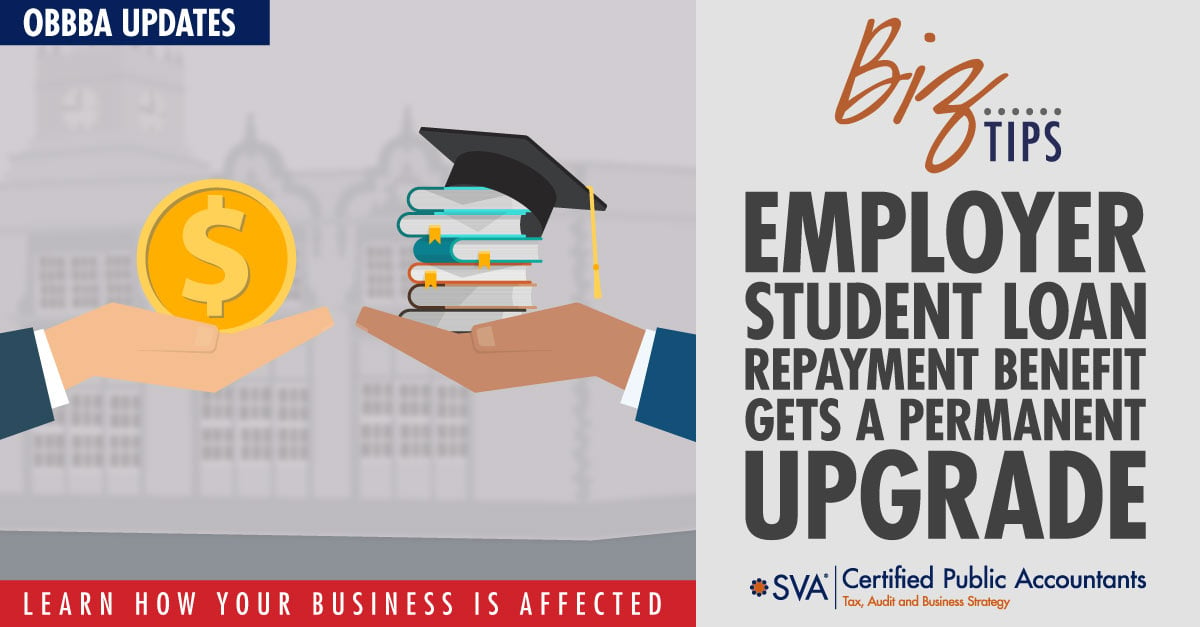| Highlights: |
- Explains how the One Big Beautiful Bill Act (OBBBA) makes the employer student loan repayment tax benefit permanent rather than temporary.
- Clarifies that employers can pay up to $5,250 per employee per year toward qualified student loan payments tax-free under a formal educational assistance plan.
- Notes that starting in 2027 the $5,250 limit will be indexed for inflation, giving businesses flexibility to increase support over time.
- Highlights benefits for businesses — competitive recruiting, improved retention and morale — and tax-deductible employer contributions.
|
Helping employees pay off their student loans has long been a valuable recruiting and retention tool, but it’s also been limited by a temporary tax benefit that was set to expire in 2025. OBBBA) changes that.
This provision of the bill locks in the popular student loan repayment tax benefit for the long haul, giving employers a clearer path to offer meaningful financial assistance to employees without triggering taxable income.
Let’s walk through what’s changed and how business owners can take advantage of it.
What Was the Rule Before?
Under the previous law, employers could contribute up to $5,250 per year toward an employee’s qualified student loans (including both principal and interest), without that amount counting as taxable income to the employee.
This provision was part of the CARES Act, enacted in 2020, and was set to expire on December 31, 2025. Contributions made between March 27, 2020, and the end of 2025 were eligible for the tax exclusion.
To qualify:
- The loan had to be used for eligible education expenses such as tuition, fees, room and board, books, supplies, or transportation at an eligible educational institution.
- The loan couldn’t be from a related party or from a qualified employer retirement plan.
- Employers had to offer the benefit through a formal educational assistance program that met specific nondiscrimination and documentation rules.
What's Changed Under the New Law?
OBBBA makes this tax exclusion permanent. That means:
- Employers can continue to pay up to $5,250 per year per employee for qualified student loan payments, tax-free.
- Starting in 2027, the $5,250 limit will be adjusted annually for inflation, giving businesses more flexibility to increase their support over time without increasing tax exposure.
This is a big shift from a temporary benefit to a permanent fixture in the employer benefits toolkit.
Why This Matters for Business Owners
This provision gives businesses a meaningful and tax-efficient way to help employees with one of their biggest financial burdens: student debt. For employers, this is a win on multiple levels:
| Recruitment and Retention |
Student loan assistance is a high-impact perk, especially for younger professionals. Offering it can differentiate your company in a competitive hiring market. |
| Tax Savings |
Contributions are deductible for the employer and excluded from the employee’s taxable income, helping both sides. |
| Workplace Morale |
Supporting financial wellness boosts engagement, productivity, and employee loyalty. |
That said, there are some things to keep in mind. You’ll need a written educational assistance program that applies fairly across your team and doesn’t favor highly compensated employees. Payments must go directly to qualified student loans.
Any amount above the threshold will be taxable to the employee. Employees cannot be given a choice between receiving cash or loan assistance, it must be a structured benefit.
What Should Employers Do Now?
If you’re not already offering student loan assistance (or you’re doing so informally), it’s time to evaluate your options. Here’s where to start:
| Run the Numbers |
Weigh the potential cost against the recruitment, retention, and tax benefits. |
| Draft a Formal, Non-Discriminatory Educational Assistance Plan |
This is required to qualify for the exclusion. |
| Establish Internal Processes |
Track who’s receiving the benefit, document the amounts and payments, and confirm the loans are qualified. |
| Communicate with Employees |
Let them know about the benefit and explain that interest paid with employer funds isn’t deductible on their personal tax returns. |
| Be Mindful of Perception |
If only some employees benefit (those with student debt), consider how others may view the value of your total benefits package. |
Heading Toward a More Competitive Benefits Package
By making this provision permanent, OBBBA gives business owners a reliable way to support employees with student debt while benefiting from a tax deduction. With inflation adjustments beginning in 2027, this benefit can grow over time alongside your business and your team.
If you’ve been waiting to implement a student loan repayment benefit, now’s the time to take a serious look.
© 2025 SVA Certified Public Accountants

